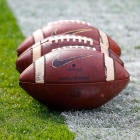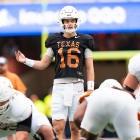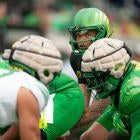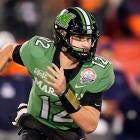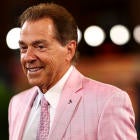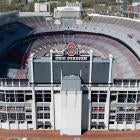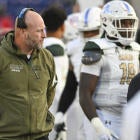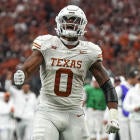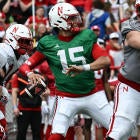Lawyers for the Ed O'Bannon plaintiffs said Monday they will not appeal a federal judge's ruling or injunction in their case against the NCAA.
"The plaintiffs are not appealing because they view this as an important win that advances the rights of student-athletes considerably,” Sathya Gosselin, an attorney for the plaintiffs, wrote in an email.
“The Court determined that the NCAA violated the antitrust laws, and the injunctive relief affords the student-athletes the opportunity, finally, to receive compensation for the use of their names, images and likenesses, free of the unlawful collusion that kept the compensation -- for decades -- at zero dollars."
The NCAA is appealing U.S. District Judge Claudia Wilken's ruling that the NCAA violates antitrust law by limiting what Football Bowl Subdivision football players and Division I men's basketball players can receive in compensation. Wilken's injunction, beginning in the 2016-17 academic year, would allow athletes to receive deferred compensation for use of their names, images and likenesses (NIL) and allow their scholarships to cover the full cost of attending college.
In a court filing on Aug. 29, the NCAA suggested its main arguments to the ruling may focus on amateurism and First Amendment rights on live television broadcasts.
The O'Bannon plaintiffs were entitled to appeal any part of the 5-year-old case. For example, last November the plaintiffs kept the door open to appeal Wilken's decision not to certify the damages class. That decision prevented the NCAA from potentially paying billions of dollars in damages at a trial loss.
There had been public speculation by pundits that O'Bannon might appeal Wilken's injunction in relation to a cap on the trust fund for NIL money. Wilken's ruling allows the NCAA to cap the fund at no less than $5,000 per year for each football and men's basketball player.
"Could it have been more? Possibly," O'Bannon attorney Michael Hausfeld said on Aug. 8. “Is it enough? When you add that amount per year per athlete for all of the schools, you're talking $300-500 million, if not more. That’s not a bad chunk."
The new ruling does not necessarily mean the O'Bannon lawyers are done with litigation. After last month's decision, Hausfeld said his team would now consider whether to take any legal action against networks for use of players’ NILs.
"It's an open field right now because of the antitrust violation," Hausfeld said on Aug. 8. "We're going to have to take a look at what our next letter might be to ESPN or CBS or Turner. We've been looking at it. For example, maybe we don't go to the larger networks but go right to the Big Ten Network or Pac-12 Network. Here you have a conference with a most direct relationship to an athlete. They're clearly using the name, image and likeness."
Hausfeld said there could be legal claims on behalf of athletes in other sports. He has also shown a willingness to get involved in the Northwestern football player unionization case before the National Labor Relations Board.
In July, Hausfeld's firm filed 1,065 pages worth of briefs and exhibits into the NLRB record. At the time, Hausfeld said he was taking no position on the ultimate legal issue in the union case.












